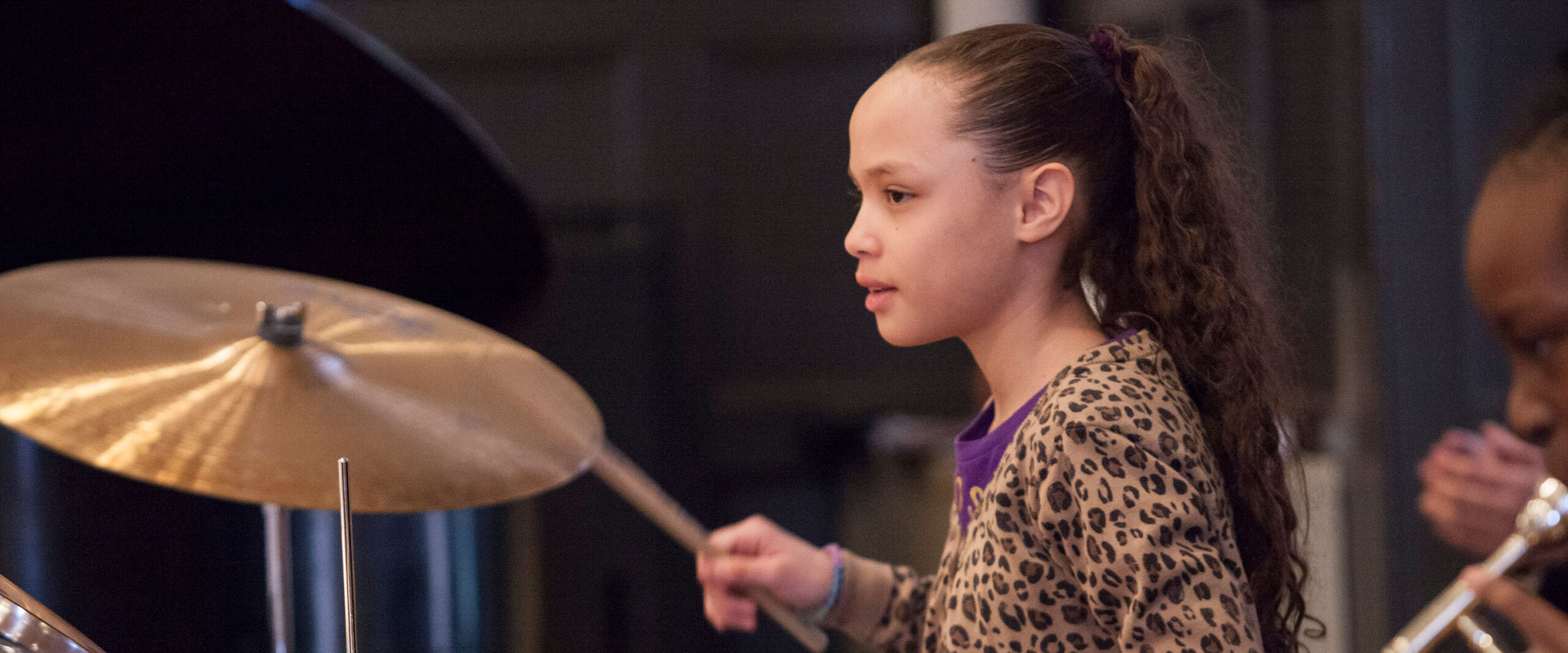EDUCATION
Summer Jazz Academy
SJA is a 2-week residential high school summer institute for advanced study in jazz performance at Bard College and Jazz at Lincoln Center.
About sja
Students will spend a week at Bard College and then transition to a week at Jazz at Lincoln Center, culminating with all students performing on the Rose Theater stage opening for the Jazz at Lincoln Center Orchestra. SJA combos will perform at Dizzy’s Club throughout the week.
Jazz at Lincoln Center’s Summer Jazz Academy is the premier high school program for advanced high school jazz students. This two-week program, designed and instructed by a select team of faculty, serves as a rigorous training institute for 42 of the most advanced and dedicated high school jazz students (grades 9–12). This is an overnight program – no commuters. Students will apply by audition and participate in one of two big bands, perform in small combos, receive private lessons, and experience classes in aesthetics, culture, history, performance practice, and pedagogy. In addition to this educational component, the institute will also feature several public performances featuring the student combos, student big bands, along with the members of the Jazz at Lincoln Center Orchestra at Bard College and Jazz at Lincoln Center during the summer of 2025.
Jump to
Curriculum
Students will be provided:
- Insight to American vernacular music and jazz specific techniques
- Understanding of jazz through the philosophical lens of the great ensembles and performers
- Introduction to the communal history of jazz in a socio-political context
- Guidance on how to interact with an audience as an artist and entertainer
- Awareness of our mission as jazz musicians today building on the aspirations laid by earlier generations
Teaching Objective
- Redefine virtuosity by emphasizing the most communicative aspects of our music
- Melody from its vernacular roots
- Expressive tone in the tradition of the great instrumentalists
- The primacy of the swing rhythm, with an emphasis on dance-ability and how to construct grooves in the African and Latin tradition
- Rhythm and harmony as time and space
- How to construct solos in the context of form and how to help the audience hear the form
- Three ways of approaching harmony:
- – The sound of each note in a chord including extension
- – The sound of common notes that can be played through a chord progression
- – The sound of progression through different keys
- – Importance of singing
Instructional Classes
Big Band: Ensembles will explore a selected repertoire from the large ensemble works of Duke Ellington, Benny Carter, Mary Lou Williams, Fletcher Henderson, Don Redman, to the pieces we write today.
Combo and the Art of the Small Ensemble: Combos will study and perform music of all eras. Students will be able to play together in less formal settings but be provided a training ground around the format and value of this time-honored jazz tradition.
Performance Master Class: An advanced course that discusses and demonstrates specific techniques of any given style including solo learning with analysis of texture, form, and meaning. Taught by listening, asking questions that require deeper knowledge and playing.
History: A survey of the artists and recordings of the works being addressed in both large and small ensembles, their placement and significance in national and international contexts, and their position in the canon of jazz.
Aesthetics: Jazz aesthetics and culture in the socio-political context through the writings of Albert Murray, Ralph Ellison, and Martin Williams. Students will be assigned readings before the start of the program and will address the concept of the blues as a cultural and social phenomenon and will be expected to understand the retro development is an important part of cultivating artistry.
Instrumental Studio: Studio lessons will focus on instrumental pedagogy from a foundational and jazz standpoint. All aspects of technique will be covered with an emphasis on breathing, tone, attack, flexibility, velocity, range, phrasing, control, special effects, reading, and expressing different emotions.
*Classes are completely dependent upon student criticism. Through the promotion of honesty, learning to critique and be critiqued provides an open forum for evaluative and reflective discussion.
Past Faculty
Wynton Marsalis, Trumpet
Kenny Rampton, Trumpet
Terell Stafford, Trumpet
Helen Sung, Piano
Vincent Gardner, Trombone
Chris Crenshaw, Trombone
Marshall Gilkes, Trombone
Ted Nash, Saxophone
Steve Wilson, Saxophone
Lauren Sevian, Saxophone
Tim Warfield, Saxophone
Jeff Hamilton, Drums
Jason Marsalis, Drums
Dr. Joseph Jefferson, Trombone
Michael Dease, Trombone
Roxy Coss, Saxophone
Steven Feifke, Piano/Arranging

How to Apply
The audition process for Jazz at Lincoln Center’s Summer Jazz Academy is competitive and applicants are ranked in comparison with others who audition on the same instrument.
The process is created to show your strengths; because the program believes in a holistic approach to education, our audition process is developed to assess your overall abilities as a musician and your potential for success. Please select the pieces for your audition for which you are the most familiar and comfortable. While we need a good representation of your playing, the quality of the video is less important than the quality of your playing.
All applicants must submit video recordings. Each video file should be its own digital file. Do not upload all audition selections and excerpts in one file. Selections should be between three and four minutes in length and selections should include the accompaniment as listed.
REquirements
- Application for admission
- A non-refundable application fee
- Audition materials